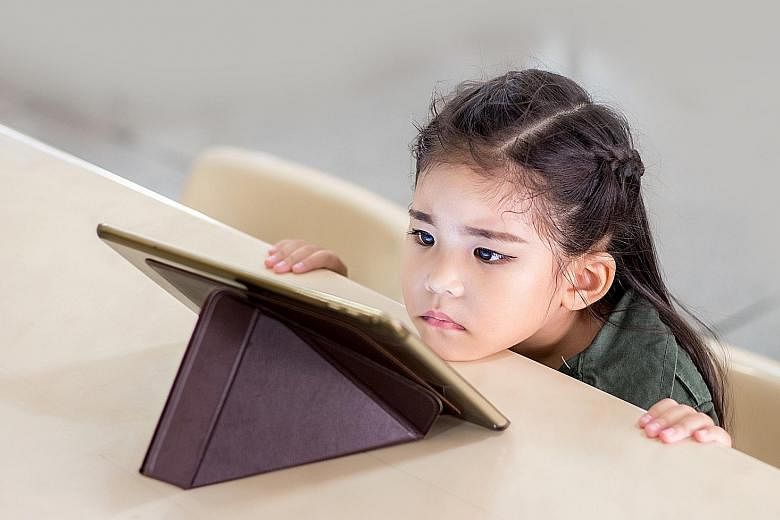LONDON • Does your three-year-old kid throw tantrums when the iPad is taken away? Does your seven-year-old like to watch YouTube all night?
Does your 14-year-old find it hard to give Instagram a rest?
Up until a few years ago, parenting advice centred on the concept of "screen time" quotas with a sweet spot of about two hours a day, beyond which media use could become harmful.
The American Academy of Paediatrics (AAP) still recommends a maximum of one hour of "high-quality programming" for children under six, but thereafter simply encourages parents to "place consistent limits on the time spent using media" and designate screen-free time as a family.
Hence, many parents will be relieved to hear that recent research suggests that it is not so much the duration, but the nature of the screen time that matters.
Ms Jocelyn Brewer, a psychologist who specialises in the concept of "digital nutrition", likens media diets to what is on the plate. Rather than counting calories (or screen time), think about what you are eating.
"It's not just about whether you consume any potential digital junk food, but also your relationship to technology and the role it plays in your family life," she says.
"We know that using screens to soothe or pacify kids sets up some concerning patterns of relying on devices to calm or distract a child - so we want to avoid using screens to placate tantrums, just like how we want to avoid eating 'treats' to calm emotional storms."
For young children, the most important thing is whether parents and kids are playing, watching or browsing together.
A study of 20,000 parents published last year by the Oxford Internet Institute and Cardiff University determined that there was no correlation between limiting device use and children's well-being.
The study's lead author, Dr Andrew Pryzbylski, says: "Our findings suggest the broader family context, how parents set rules about digital screen time, and if they're actively engaged in exploring the digital world together, are more important than the raw screen time."
Another study in December by the University of Michigan on children aged four to 11 similarly found that "how children use the devices, not how much time they spend on them, is the strongest predictor of emotional or social problems connected with screen addiction".
But the authors said concern over a child's screen use is warranted when it leads to poor behaviour, loss of interest in other activities, withdrawal or deception.
Most research agrees that although specific screen time limits are dated, there does come a point where excessive device use has negative impacts, affecting sleep, health and mood.
Talk about kids and technology usually tends towards the negative, but it does not have to be so.
The Internet and video games can be fun, social and provide a new creative outlet for children.
The consensus is that screen time, in and of itself, is not harmful - and reasonable restrictions vary greatly, depending on a child's behaviour and personality.
There is little point in obsessing over how many minutes a day your kids are spending with screens.
Instead, parents should be doing what they can to ensure that what the children are watching, playing and reading is high-quality, age-appropriate and safe - and joining in wherever possible.
"It's important there is balance in the online and offline worlds and in leisure and learning, but what that looks like for different kids at different ages and in different families is hard to prescribe," says Ms Brewer.
"Research shows that not having access to the digital world has a negative impact on kids - so it's about finding the right amount with a holistic approach.
GUARDIAN

